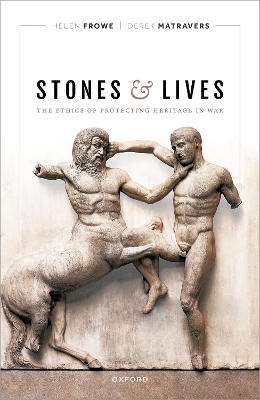
Stones and Lives
Oxford University Press (Verlag)
978-0-19-887766-0 (ISBN)
The fate of heritage in war has attracted considerable attention in recent years, due in no small part to ISIS's campaign of destruction across the Middle East and, in 2012, the International Criminal Court's first prosecution of heritage destruction as a war crime. Regular armed forces have been criticised for both failing to protect and damaging heritage sites. In response, heritage organisations urge the better implementation of existing international laws on heritage protection in war. This book argues that any such law or policy will require combatants to choose between safeguarding heritage and safeguarding other goods, including human life. It thus challenges the view, repeatedly expressed by heritage professionals, that the choice between protecting heritage and protecting lives is a false dichotomy. Existing international law not only implies such choices but also, more worryingly, gives no indication of how they should be resolved.
Drawing on contemporary work on the ethics of war, this book develops an account of the permissible protection of heritage in war. It argues that heritage is not morally special; rather, heritage is one of many goods that contribute to individuals' lives going well and that we routinely trade off against each other. By drawing on these more familiar dilemmas, we can make progress on how to balance the protection of heritage against risks to human life. Amongst other things, the book considers the different ways in which heritage might contribute to individual flourishing, the role of consent in justifying the imposition of risk on combatants and civilians, the permissibility of forcefully defending heritage and what, if anything, could compensate for the loss of heritage in war.
Helen Frowe is Professor of Practical Philosophy and Knut and Alice Wallenberg Scholar at Stockholm University, where she directs the Stockholm Centre for the Ethics of War and Peace. She is the author of Defensive Killing (OUP, 2014) and The Ethics of War and Peace: An Introduction (Routledge, 2022) and co-editor of Heritage in War: Ethical Issues (OUP, 2023), The Oxford Handbook of Ethics of War (OUP, 2018) and How We Fight: Ethics in War (2014). She was the recipient of the 2019 Marc Sanders Prize in Political Philosophy. Between 2017-2020, she was co-investigator on the AHRC-funded Heritage in War project. Derek Matravers is Professor of Philosophy at The Open University and a Fellow of Churchill College, Cambridge. He has written Art and Emotion (OUP, 1998), Introducing Philosophy of Art: Eight Case Studies (Routledge, 2013); Fiction and Narrative (OUP, 2014); and Empathy (Polity, 2017). He is the author of numerous articles in aesthetics, ethics, and the philosophy of mind. His edits, with Paloma Atencia-Linares, The British Journal of Aesthetics.
1: Introduction
2: Conflicts in Heritage Protection
3: Instrumental Justifications for Risky Heritage Protection
4: The Intrinsic Value of Heritage
5: Imposing Risks on Civilians
6: Combatants, Consent, and Contracts
7: Combatants and the Incurring of Risks
8: Lethal Defence of Heritage
9: Compensation for Damaged Heritage
10: Conclusion
| Erscheinungsdatum | 23.08.2024 |
|---|---|
| Verlagsort | Oxford |
| Sprache | englisch |
| Maße | 162 x 243 mm |
| Gewicht | 444 g |
| Themenwelt | Kunst / Musik / Theater |
| Geisteswissenschaften ► Geschichte ► Hilfswissenschaften | |
| Geisteswissenschaften ► Philosophie ► Ethik | |
| ISBN-10 | 0-19-887766-8 / 0198877668 |
| ISBN-13 | 978-0-19-887766-0 / 9780198877660 |
| Zustand | Neuware |
| Haben Sie eine Frage zum Produkt? |
aus dem Bereich


